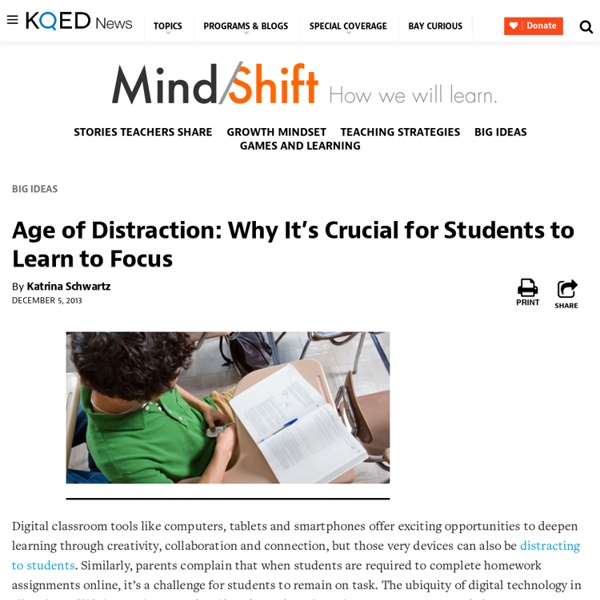Alpha History: Because the past matters
Social Media for Teachers: Guides, Resources, and Ideas
Although students are evermore connected to the social web, many of these networks remain out-of-class digital playgrounds where students congregate. In a 2014 survey of 1,000 teachers, just one in five said they use social media regularly with students. Of course, it can be a challenge to incorporate social media into lessons. There are many gray areas for teachers to navigate, like setting guidelines, accessibility at school, and student safety. More Great Reads From Edutopia In addition to those great guides, there is a lot of useful information right here on Edutopia.
How to teach history | AC History Units
There is no single 'best' way to teach history. Research suggests that good history teachers know the content, use a variety of approaches, explicitly teach the skills of historical inquiry and analysis, tailor learning opportunities to suit their students' stage of development, and encourage deep understanding. Activities There is room for a range of teaching and learning activities in the history classroom: a story well-told by the teacher, a museum display (actual or digital), model-making, the construction of timelines, comprehension and source analysis activities, oral history interviews, site studies, simulated excavations, problem-solving exercises, role plays and debates. Activities like these can be tailored to suit students' stage of development. Approaches Approaches to pedagogy can be teacher-centred or student generated, inquiry based or teacher directed, completed individually, in pairs, groups, or as a whole class, and involve digital resources to varying degrees. Resources
HSC : All My Own Work :: Home
Four Corners 50 Years - Home
Welcome to a celebration of 50 years of ABC Television’s premier News and Current Affairs program, Four Corners. This website is a celebration of our history, which is not only TV programs, it is the successful collaboration of people: executive producers, reporters, researchers, editors, producers, crews and administrators, all of whom have played a significant role in the program’s history, identity and success, from 1961 to the present day. Four Corners’ reports have explored cultural and social change, political upheaval, conflicts, disasters and terrorism, with an eye on national and international events. This website will showcase the key stories, people and events we have covered over the past 50 years, and will stand as a living archive to five decades of vigorous reporting on ABC TV. You can explore our vast archive of programs by decade or by theme. The website also presents extended interviews with reporters, executive reporters, researchers and cameramen.
LIST OF PUBLISHERS
Beall’s List: Potential, possible, or probable predatory scholarly open-access publishers This is a list of questionable, scholarly open-access publishers. We hope that tenure and promotion committees can also decide for themselves how importantly or not to rate articles published in these journals in the context of their own institutional standards and/or geocultural locus. Last updated December 28, 2015 Appeals: If you are a publisher and would like to appeal your firm’s inclusion on this list, please go here. Like this: Like Loading...
Why Do We Still Care About Shakespeare? | Ovations | UTSA's College of Liberal and Fine Arts Magazine
By Cindy Tumiel Four hundred years have passed since William Shakespeare penned his last play. Yet his prose, plots and characters are as alive today as they were when the plays were originally staged during the late sixteenth and early seventeenth centuries. For two of UTSA’s eminent literary scholars, the bard of Avon’s enduring appeal is an enduring topic as well. The answer is simple for Craven, a professor emeritus at UTSA who taught his first Shakespeare course back in 1965. “He is the greatest dramatist, the greatest poet and the greatest prose writer in the history of the language,” said Craven, who teaches undergraduate courses in Shakespeare and has seen all of his plays performed at least once. The language is rich, the characters are complex and many of his basic themes – love, treachery, honor, bravery and political intrigue – still resonate today, said Craven. Alan Craven Mark Bayer, an associate professor and chair of the Department of English at UTSA, agreed. Mark Bayer
A Good Way to Create and Save Mind Maps to Google Drive
October 25, 2014 MindMup is an excellent web tool that allows you to create beautiful mind maps. Mindmup does not require registration and is very simple to use. It is also integrated with Google Drive so you can save your mind maps straight to your Drive account. MindMup also provide a set of good extensions to enhance your mind mapping. Some examples include: Realtime collaboration: This is a good feature to use with students in class. Progress Progress allows you to manage hierarchies of tasks faster by propagating statuses to parent nodes. Straight lines This extension converts funky curve connectors into straight lines, which makes it clearer to see what connects to what on large maps. When you are done working on your mind maps you can then save them to your Dropbox or Google Drive.



